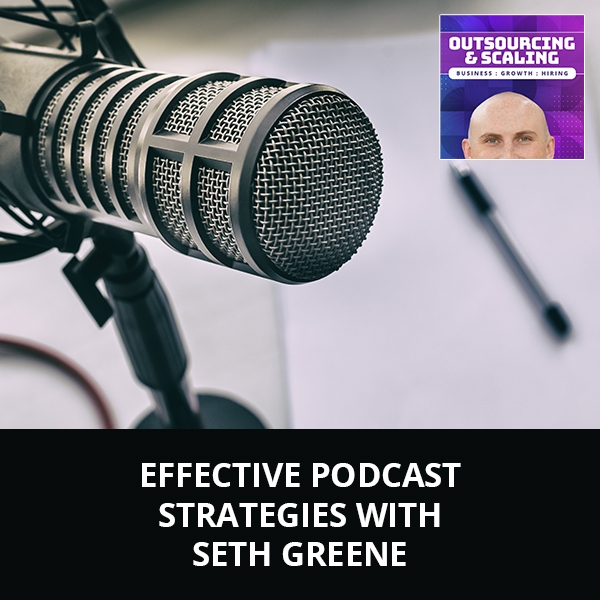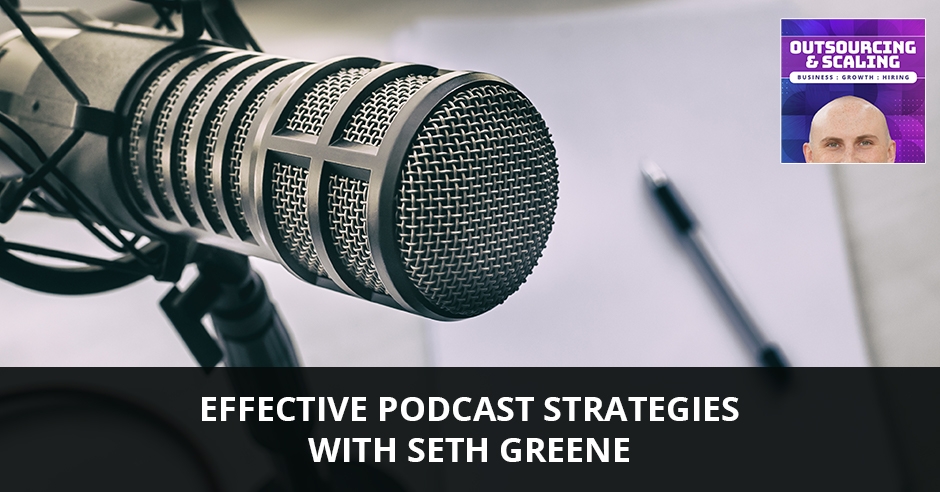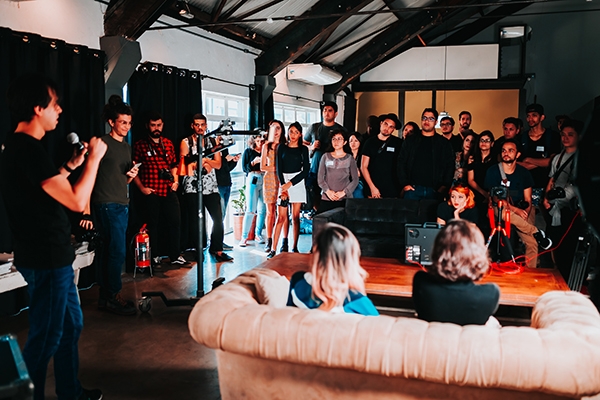


There has never been a more exciting time to be a marketer or a business owner than now. Seth Greene, an entrepreneur and the founder of the direct response marketing firm, Market Domination LLC, joins us today to inspire us to start our own business. Learn how his desire to teach others led him to a successful path, even with a few bumps along the way. Seth talks about his SharkPreneur Podcast which he co-hosts with Shark Tank’s Kevin Harrington and how this platform is instrumental to gaining more audiences and clients. He also touches on the exciting future of podcasting and shares the secret to staying on top of your game.
—
Listen to the podcast here:
[smart_track_player url=”https://www.podetize.com/statsapi/www.podetize.com/wp-content/uploads/fileuploads/11-5b145ef137b51b3d1af0633e9305c43d/08/2019/13aed850988c806673e4907341c24298.mp3″ title=”Effective Podcast Strategies with Seth Greene” artist=”Nathan Hirsch” image=”https://freeup.net/wp-content/uploads/2019/04/OAS.png” ]
Download the audio file here.
Effective Podcast Strategies with Seth Greene
I’m here with Seth Greene. Seth, how are you doing?
I am fantastic. Thank you so much for having me. I am super excited to be here and share with your tribe.
We’re excited to have you. I know you’ve had me on your podcast. For those of you that don’t know it, Seth is the nation’s foremost authority on cutting edge direct response marketing. He’s a cohost of the SharkPreneur Podcast with Kevin Harrington, who a lot of people know from Shark Tank. It has just been named one of the Top Ten Podcasts to listen to in 2019 by Nasdaq. He’s a Founder of the direct response marketing firm, MarketDominationLLC.com and he’s a seven–time bestselling author who’s been interviewed on NBC, CBS, Forbes, Entrepreneur, CBS MoneyWatch and many more. Seth, we’re honored to have you and we’re going to talk about all of that, but first, let’s take a gigantic step back. Talk to me what you were like growing up. Were you a rebel? Were you a straight A student? Walk us through that.
Before I started MarketDominationLLC.com, it depends on how far back you want to go. I would say I was a brat until I was hospitalized for a serious illness when I was about sixteen and literally grew up overnight. I was told that my stress and my emotions had a great deal to play into my physical symptoms and realized I had to stop being a jerk and being self–centered. I realized I had to get out of my own head and get my emotions under control and mature a little bit. I did a lot of soul–searching. I was in the hospital for a couple of months. A lot of meetings with my rabbi, a lot of soul searching about why this happened, how did this happened and trying to figure out where my place was in the world and how I could serve my purpose and feel better. What’s funny is I’ve done over 300 interviews and I’ve never talked about that.
Explain this because I think a lot of people when they hear someone’s getting really stressed out and that’s leading to health issues, the last thing they think is, “That person should go be an entrepreneur.” Being an entrepreneur is full of stress. If you want to avoid stress, you go become a teacher or something. What was your mindset there and why did you want to become an entrepreneur after going through that?

You’re absolutely right. You don’t think being an entrepreneur is the solution to stress. It’s funny. I had made a list of the six things I wanted to do when I grew up and entrepreneur was on there, author was on there, actor, which was even more stressful and a couple of others. I went to undergrad. I went to Syracuse University for a degree in acting. That was what I was going to do when I was eighteen, which is an even bigger roller coaster than being an entrepreneur because at least there, you have some control. You can go sell something and make some money, whereas as an actor where you’ve got to audition all the time and hope you find something that is your lucky break. I would say, “How did the journey to entrepreneur come about?” I did after college when I decided I didn’t want to be an actor anymore and I didn’t want that stress. I went to work for a Fortune 500 company as a college financial planner. I had that safety net even though it was a commission-based job.
After a number of years of learning direct response marketing and getting really good at it and I got tired of fighting with the compliance department at the giant company that was paranoid and thought their job was to say no. I left and started my own company, first in financial services to do the type of marketing I was learning from Dan Kennedy. I would become one of the top 30 financial advisors in the country for opening new accounts because the marketing works so well. Financial advisors started finding me and saying, “How do I do that?” I started a marketing company and MarketDominationLLC.com several years ago to start off teaching financial advisors how to do what I did. It has since grown to 62 different industries, thousands of clients and on every time zone on the planet where we help other business owners and entrepreneurs grow their companies.
Talk to me about you’re one of being an entrepreneur because I feel like that’s the make and break year. There are a lot of things that come up that you don’t expect. You’re learning how to be responsible for yourself and all the responsibilities there. How did that first year go for you and what did you learn?
Being in a podcast gets you speaking gigs, media exposure, interviews, referrals, and relationships that turn into clients.
The first year was rocky. I had borrowed the money. When I left the Fortune 500 company, I had to recruit offers from other Fortune 500 financial services companies based on my success. They were willing to throw signing bonuses at me and throw a significant amount of money to incentivize me to come work there. Instead, I went and started my own firm. I gave up a multiple six figures signing bonus and had to go into debt. I had to borrow the money to launch my own company. There was a lot of pressure. My wife quit her job. We had gotten married, bought our first house, had our first baby and she quit her job to be a stay–at–home mom that year. I was the sole breadwinner, lots of pressure, which is never fun. The first couple of months, I was trying to get my office set up, learn the new companies, learn the new paperwork, learn the new systems for managing money and most importantly, trying to get all my couple of hundred clients from the Fortune 500 company to come with me.
The Fortune 500 company had an office full of people calling them saying, “No. Seth has left. Stay with us,” and me saying, “No, come with me.” I was fortunate and that I had great relationships with them and a large percentage of them did come with me. The problem was they didn’t have any urgency. I went independent in October of ‘07, right before the bubble burst. What I wasn’t thinking was running into the holidays. I was sending out packages of paperwork of transfer forms and people were like, “Thanksgiving is coming up and that I’ll do it after that.” “No, I’ve got to go on vacation and it’s the holidays and I’ll do it after the first of the year. I’m not in a rush.” I was in a rush because unless they moved over, I don’t get paid because I had no revenue. I was going crazy. Thankfully I had borrowed the money to stay afloat going, “Why didn’t they do it yesterday? I needed the money yesterday, but they weren’t ready to move when I was ready to have them move.”
I know you’ve hired a lot of people. I know you use the FreeeUp platform as well. Talk to me about your first hire. How did that go and what was that experience like?
The first hire should have been much sooner. I wish I had started hiring sooner. My first hire was so funny. I had a number of interns come work for me from the local colleges and some of them would go to work part–time. My first full–time hire is still with us to this day. My mother is responsible for that. She was at our synagogue and she was talking to a gentleman from the temple and said, “Aren’t you in marketing?” The guy said, “Yeah. My son does some marketing.” That’s what I get. Marketer of the Year from Dan Kennedy nominee, three years in a row, I get some marketing. My mother still doesn’t understand everything I do. She said, “You should go talk to my son.” He came in and talked to me. We hit it off. I hired him first for a copywriting project, freelance to see how he did and if he has multiple TV Emmy awards for TV writing, I wanted to see if that can translate. If I could turn him to the dark side of direct response marketing, which worked. He’s been with us ever since and he’s contractor number one. He since has grown not just to be our number one copywriter, but he’s now president of our entire publishing division.
Any horror stories or any bad experiences that stand out?

My two ones, I got a phone call from jail that’s never happened before and literally it was my contractor‘s mother crying going, “He was in a car accident. He got arrested.” It turns out he was high and caused the car accident and it turns out he’s addicted to painkillers that nobody knew about. He’s going straight from jail to court–ordered rehab. We had no idea he was hooked on drugs. When we called all of the clients he was responsible for, we found out that he hadn’t been doing what he was supposed to be doing for months. At the time, I didn’t really have a management system. It was all just me walking around and talking to my team, asking them questions, trying to keep it all straight in my head. We found out he hadn’t been doing much work because he had been high for months and lying about it. I had to beg all of his clients to forgive us, give us patience. I personally did all the work he was supposed to do to catch up. I offered refund checks. Most of my clients were heroically understanding. We were able to catch up.
Now, we have drug testing as a part of working here. That inspired us to invent a management system that literally tells each team member what to do every day and make sure they do it without me having to micromanage the process. It inspired something that is turning into a separate service company. There was a silver lining. We had a team member who every week in her staff meeting would report some great results on what she was doing. She was a guest booker for our podcasts and I started getting clients going, “I can’t get ahold of that person she booked me for.” I started checking and noticing, “I called that company and they said this person’s been retired for five years, but you reported them to say yes to being a guest.” I said, “What’s going on?” After four or five attempts to get the truth out of her, it turned out she wasn’t doing the work. She was getting lousy results on the stuff she did do. She felt bad so she lied in our staff meetings and said she did it. We let her go.
I know you have a virtual system in the Philippines and you’ve got a freelancer you got some FreeeUp. You have your internal team and they’re in an office, right?
Yes. We have offices in six states, in three countries, including your guys through FreeeUp. We’re up to now 33 team members. Some are physically here in our offices, some are in our offices in other states. US and Canada are physical, then the Philippines is virtual and we use FreeeUp a great deal.
How do you balance that? I think that’s where a lot of people struggle. They either go entirely in house, they go entirely remote and then you find the people that are doing both and mixing it together and it’s not easy. What have you found works when you’re combining them?
Having a project manager and manage those people, check up on those people every day. Having a software program that manages the process so the project manager and I can see everything that’s getting done and when it’s not getting done. Find out why before we end up three months into issues and have clients screaming at us.
You’re on a podcast. Your cohost is Kevin Harrington. I’m assuming you didn’t just call Kevin up one day and say, do you want to do a podcast with me? Is there a story behind that? How’d you end up working with Kevin?
Having a podcast is a great way to get testimonials from your client.
I’ll try and sell the short version of the story. I kidnapped Kevin. I met him. He has spoken at an Entrepreneurs’ Organization event. I waited in line and instead of asking for a picture or an autograph, I said, “Mr. Harrington, I’m here to take you to the airport.” He said, “I’m going to get a cab.” This was before Uber. I said, “No, I insist. I’m taking you to the airport.” He was nice and said yes. I drove slowly to the airport because it’s Buffalo. I knew where it was and I had 20, 30 minutes to pitch him. I met him before we were podcasting. I pitched him on our service that optimizes traffic and conversion for eCommerce websites and marketing funnels. We pointed out twelve holes in the AsSeenOnTV.com funnel. He said, “You got my attention.” He gave me his information. I sent him a shock and awe box, which is a whole separate conversation. He said, “Yes,” and that started a consulting relationship with As Seen on TV before he sold it and then a friendship.
He started hiring us to market some of his portfolio companies from Shark Tank and other venture capital deals. That worked really well. I started speaking a lot of the same events he was. About two years ago, we were having dinner at an event and he said, “What’s the latest thing you’re doing that’s sexy beyond the stuff I know about?” I said, “We have a program where we produce a done–for–you podcast, turn it into a book, make you an authority in your marketplace. We then recruit your top 50 dream affiliates or clients to be on the show and build a relationship with them for you by tripping on them several times a month with direct mail.” He said, “I want a show. I don’t want to do any of that work but that sounds amazing. You already have a show,” which I did. He said, “How about I come on, be your cohost? We rebrand it around the both of us and I’ll come on and do one episode a week. You can do the rest on your own and I’ll promote the episodes I’m on.” I said, “As they say on Shark Tank, I’m in.” That turned our show, which was called Direct Response Marketing into SharkPreneur. The service that does that is at YourDream50.com which is what got Kevin excited.
Talk a little bit about podcasting because I think a lot of people out there, including me, just launched a podcast and they see it as, “Everyone is starting a podcast,” but they don’t understand why. What are the opportunities that come up? What opportunities have you had since you started a podcast that you might not have had if you didn’t?
The podcast has gotten me paid speaking gigs. It’s gotten me media exposure. I’ve gotten quite a few media interviews because of the show. One of our backdoor secret strategies for getting the press to write about you is interview the reporter you want to write about you on your show because the reporters get no love. The people they write about get all the love. If you give the reporter an ego stroke and have them on your show, a lot of times at the end of the show they go, “Tell me about you.” They say, “We should really write about that,” which has been very fortunate. We’ve had that happen many times. You can get speaking gigs, media attention and clients. We start relationships with people on our show and then have a follow-up system to turn them into clients. You can get referral sources and joint venture partners. We’ve interviewed a number of people on our show who then we’ll do a webinar swap with us or email promotion to their tribe about us and we get business that way.
It’s a great way to get testimonials. If you interview a client of yours for 20 to 30 minutes, in that 20 to 30 minutes, you can strategically ask questions not the entire show, but you can get a decent length testimonial out on the show. It’s where you say, “Tell everybody how we met and what problem did you have before you found us and how did we solve it for you,” and there’s your testimonial. The rest are regular questions about their business and their life and stuff like that. There are a lot of different ways to play it. If you do it strategically as we do. We are the antithesis of most podcast production companies that want you to get followers. You can sell ads. I don’t personally think anybody really wants a second job selling ads on their show and 92% of podcasts are never going to get 10,000 listeners and episode so that they can sell ads. We’ve literally had clients who made money when they had nine listeners to their show.
I think it opens up a ton of opportunities. Let’s talk about marketing. You’ve been in this space for a while. How have you seen marketing really change over the years and what’s working in 2019?

The fundamental principles of why people buy and why they do the things that they do haven’t changed. That’s the same differences. We now have more media outlets to reach them than ever before. I started the MarketDominationLLC.com back in 2007. That’s twelve years. We now have social media. We didn’t have Facebook then. Now, we’ve got Facebook, Instagram, YouTube, Twitter, Snapchat and everything else. We’ve got a podcast. This is the new ground floor. Every couple of years, they get a new renaissance and a new audience.
I would say now, because of the global proliferation of smartphones and the fact that Apple Podcast interface is embedded in your dashboard on your car, if you get a new car, now is the new ground floor of podcasting. The US audience that listens to a podcast is about to triple in the next year. We should be at three billion people in the relatively near future, which is a whole lot of people that are great prospects for your target market. I think you’ve got more specific ways to reach people than ever before. There has never been, in my opinion, a more exciting time to be a marketer or a business owner than now.
I love it. You’ve had a lot of success. You’ve grown this business and grown your podcast. Are there certain habits or certain routines that you put yourself through that you’ve found that lead to success for you as an entrepreneur?
We’ve got a number of them. It depends on what you’re talking about. If you’re talking about a morning routine, like you might read in The Miracle Morning or The Perfect Day Formula, I’ve got one at home when I wake up. We’ve got another one as a staff where we do our staff meeting, we do our affirmations, we do our goals and then we talked about what we’re working on that day in that week. That gets us as a company in the right frame of mind. That’s for people who are physically here, who are in the right time zone, who can do it with us. In terms of marketing and business development, I’m always learning. I literally read a book every single day. I’m constantly consuming content and trying to stay on the cutting edge and go to events like Traffic & Conversion with you and participate in mastermind groups so that I can keep seeing what’s coming next so that we can stay on top of it.
A lot of people reading, they know you say you read one book a day and I know you and I talked about this before, walk people through it. How do you possibly read one book a day?
I have taken a couple of different speed reading courses and my goal was to be able to read fast and retain it. I am not doing the finger down in the middle of the page and skipping half of it to flip through it. I’m trying to read the entire book and remember it. I’ve taken a couple of speed reading classes. I’ve taken the best of what works from those along with the fact that I was a fast reader before. I have a really well–trained memory so I can generally get through a couple of hundred–page book in an hour. Whether that’s the first thing when I get up or if that’s after the kids go to bed, I will generally squeeze in an average of one a day. There are times I only make it halfway through and there are times I can read two. It just depends on how much “downtime” I’ve got.
How do you decide what books you want to target next?
The fundamental principles of why people buy and why they do the things that they do haven’t changed over time.
There’s an entire world of marketers running Facebook ads that show up on my newsfeed offering free plus shipping offers on their books. That helps. Number two, I don’t know how. I think I’m on a bunch of people’s lists. People send me their books. They just show up in the mail. I don’t even request them. I get books and we’ll usually write a review, which is probably why people send me stuff. A lot of times we have a lot of business owners who are authors on the SharkPreneur show. Their PR people will send books ahead of time and say, “Would you consider putting this person on your show with a copy of their book?” There’s me going to Amazon and seeing, “If you’d like this, you will also buy that.” There are also certain authors I follow who keep writing more books that I always buy anything they put out.
Let’s say there’s an entrepreneurial reading out there. They have a business model, a little bit of success and marketing is their weakness. For whatever reason, they are just not a good marketer. Is there some overall advice or some stepping stones that you can give them to point them in the right direction, especially stuff that’s working now?
I’d recommend a couple of books. I’d recommend DotCom Secrets and Expert Secrets by Russell Brunson. I would recommend No B.S. Marketing to the Affluent from Dan Kennedy. I would say, the most important factor that affects how well their marketing is going to work is who the target market is. I would spend half of my time in any marketing campaign, micro–niching down who that target market is going to be before I wrote a word of copy, recorded a video, built a landing page or worried about a Facebook app.
Thank you so much for coming on. Tell people more about what you’re working on now and how people can get ahold of you.

The main corporate website is MarketDominationLLC.com where you can go and grab a time on my calendar if you want to talk about your business and what’s going on. I’m happy to help anybody who’s a user of FreeeUp or a follower of Nathan’s. If you want to learn about our done-for-you podcast into a book, into authority maker, into relationship builder service, that’s at YourDream50.com.
We also have a webinar that Seth put on our YouTube channel. We have in our social media as well. Seth, thanks again for joining us and I’m excited to see what’s next for you in 2019.
Thank you so much. Keep getting me more great people to hire on FreeeUp.
Important Links:
- Seth Greene
- SharkPreneur Podcast
- MarketDominationLLC.com
- AsSeenOnTV.com
- YourDream50.com
- The Miracle Morning
- The Perfect Day Formula
- Traffic & Conversion
- DotCom Secrets
- Expert Secrets
- No B.S. Marketing to the Affluent
About Seth Greene

Seth Greene is the nation’s foremost authority on cutting edge direct response marketing.
Seth is the co-host of the SharkPreneur podcast with Shark Tank’s Kevin Harrington which was just named one of the top 10 podcasts to listen to in 2019 by Nasdaq.
He is the founder of the direct response marketing firm www.marketdominationllc.com and he is a 7 time best selling author who has
been interviewed on NBC news, CBS news, Forbes, Inc, Entrepreneur.com, CBS Moneywatch and many more.
